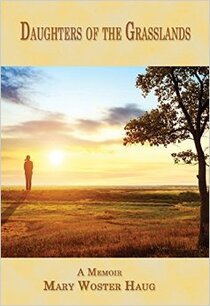With the open information attitude and international connectivity brought on by the Internet age, women are challenging what it means to be wife, mother, and daughter, raising their voices to share their stories and capture the imaginations of young girls internationally. Few express this better than Mary Woster Haug, author of Daughters of the Grasslands: A Memoir. She claims that tradition and honor are the chains that bind girls to the same limited resources that their mothers and grandmothers have struggled with. In order for girls to fight these concepts, they must often turn against their own mothers, or feel as though they are: Not a battle for the faint of heart. Raised on the grasslands of North Dakota, Haug is a modern woman born from tradition. A self-proclaimed feminist, she tells of her personal evolution away from the values that buoyed her own mother, and Haug’s effort to escape the judgement she read so plainly in her mother’s features. Haug runs all the way to South Korea, taking a year-long professorship at the University in Daejeon. What she discovers is that mother-daughter conflicts are universal. Instead of escape, South Korea is more a harsh emersion into the tensions Haug never wanted to face. She repeats the concepts of tradition and honor again and again, trying to understand just how these intangible words can hold so many women back going for their dreams, binding them instead to their perceived cultural obligations. The narrative, well-woven and non-sequential, allows the reader to get a sense of how Haug became the world-traveling professor, wife, and daughter she is today. The structure of the book is used as a way for Haug to show cause-effect, using experiences in the author’s past with her mother and other female role models as the implied catalysts for her later choices. In this way, the story is extremely satisfying, as Haug manages to remove the sense of randomness from human life and gives each moment profound meaning, causing the reader to reflect on his or her own childhood and how each memory can be linked to later behavior.
Haug also explores the social pressures found in Korean and American society, comparing and contrasting the two. The author uses it to gain perspective on her experiences, but it serves to introduce the reader to the South Korean culture. It is the stories of the people she encounters that give her book the depth and give the reader a break from Haug’s own voice. In her office at the University in Daejeon, where students would come to practice English with the Westerner professor, Haug describes how girls would curl their wraith-like bodies into the cushioned armchair and whisper their dreams for careers, for travel, for a chance to mold a new definition of family honor. Through these girls, Haug explains the rigidity of Confucianism, the reigning belief system in South Korea, where women are still expected to be silent servants to their parents and husbands. The author makes a few very interesting comparisons to Christianity, connecting to students like Honey and Bora, who both desire more than babies and husbands, over the crisis that comes when their Faith begins to turn on them. Haug’s is a slow and steady pacing, her words nearly sepia toned as she reminisces and reevaluates her memories. These outside stories are like small bursts of color, new voices and new tones that recapture the reader just when they were starting to drift. By the time Haug’s voice returns, she seems fresh again, and so the reader can continue without complaint. The stories also validate Haug’s own conclusions, providing evidence that she is not the only woman to have doubts and concerns, nor is she the first, or last, to break away from a mother’s expectations. It seems to be a way of soothing her personal fears of having made too many mistakes. While both men and women can find a connection to this story, it is a perspective that portrays the limitations that women endure within the world’s so-called modern societies and the sense of self required to break through them. The most important lesson Haug imparts is that the first battle for change begins at home, at the source of a little girl’s point of view framework, her mother. This memoir as a text is a compelling read that certainly prompts contemplation of the reader’s own childhood and parental influence. Sometimes this contemplation pushes one out of the story line, too lost in one’s own memories and musings to follow Haug’s own, but what is the point of writing if not to create thought? A book for the bedside table, for the train ride, and for park benches.
0 Comments
Leave a Reply. |
Archives
July 2024
Categories
All
|
|
Glassworks is a publication of Rowan University's Master of Arts in Writing 260 Victoria Street • Glassboro, New Jersey 08028 [email protected] |
All Content on this Site (c) 2024 Glassworks
|


 RSS Feed
RSS Feed
